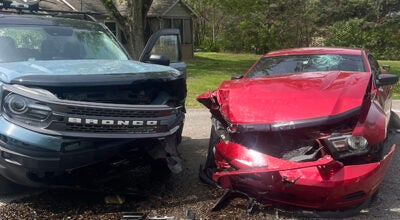City cops cope with cuts
Published 7:14 pm Sunday, February 12, 2012

Daily Star photo/AARON MUELLER Niles Police Chief Jim Millin takes on the police department in time of budgetary constraints.
It’s been an interesting past few months for Niles Police Chief Jim Millin.
His promotion to chief in October meant taking on new responsibilities but didn’t mean leaving behind his old ones. The city elected not to replace position of police captain due to budgetary constraints.
The force also couldn’t replace ex-cop Ivery Cross, who was sentenced to prison for sexually assaulting an inmate last year.
For Millin, handling the new responsibilities of the job has been simple.
“Work more hours,” he said. “I mean, there’s a lot of nights that I don’t get out of here until 6 or 7 in the evening. There’s a lot of weekends, but that kind of just comes with the job.”
Millin’s job description not only entails overseeing the patrol division and dispatch unit but also handling staffing, budgetary issues, federal grant funding and policies.
Millin said he leans on lieutenants and officers to do some of his administrative tasks to ease the burden, and it helps having Ric Huff, city administrator and former police chief, “just down the road” at City Hall.
“He helps out whenever a question comes up. I definitely tap into that resource,” Millin said.
More with less
But it’s not just Millin who is busy handling more work. The entire department is expected to do more with less. The department is down about six officers in the past seven or eight years, Millin said.
An officer quit in December, and while the city is planning to replace him, the force is currently running with 16 full-time officers and two part-timers.
Millin said the department hasn’t had to switch up its shifts, but he’s considering switching to 12-hour shifts from its current eight-hour format.
“With 12-hour shifts, we’d be able to put more officers on the road at one time, so that’s an advantage for us,” he said. “And the advantage for the officers is more days off per year.”
Staffing levels right now are at the bare minimum for a 12-hour shift format, Millin said.
Keeping officers on the road is definitely a challenge with the reduced staffing. Millin estimates there are two to four on the streets at a time, although the shift supervisor can call an officer from home at any time for backup.
The staffing cuts also have caused the department to prioritize its calls.
“Certainly crimes against person are going to be prioritized over crimes against property,” Millin said. “So if someone calls in and complains their fence was spray painted, they might find themselves waiting a little bit longer if an officer is tied up with a domestic or an assault.”
The limited number of officers can also affect how much proactive police work officers can do, Millin said.
“When we had five or six on the road, if two or three were handling calls, that left a couple to go out and run traffic and be much more proactive,” he said.
Technology helps
With calls for service holding steady and staffing reduced, Millin said the department has looked to technology to help the cause.
About a year ago, police cars were equipped with mobile data terminals so officers are able to begin their reports from their vehicle, which saves time and lessens the demands on dispatchers.
Millin is also exploring software that would allow residents to report minor offenses online, another potential time-saving measure for officers.
Millin said he is proud of the way his officers have handled the limited resources.
“Even with our limited numbers, our priority is still to serve the public,” he said. “We have an excellent team, doing anything we can to serve the public.”






